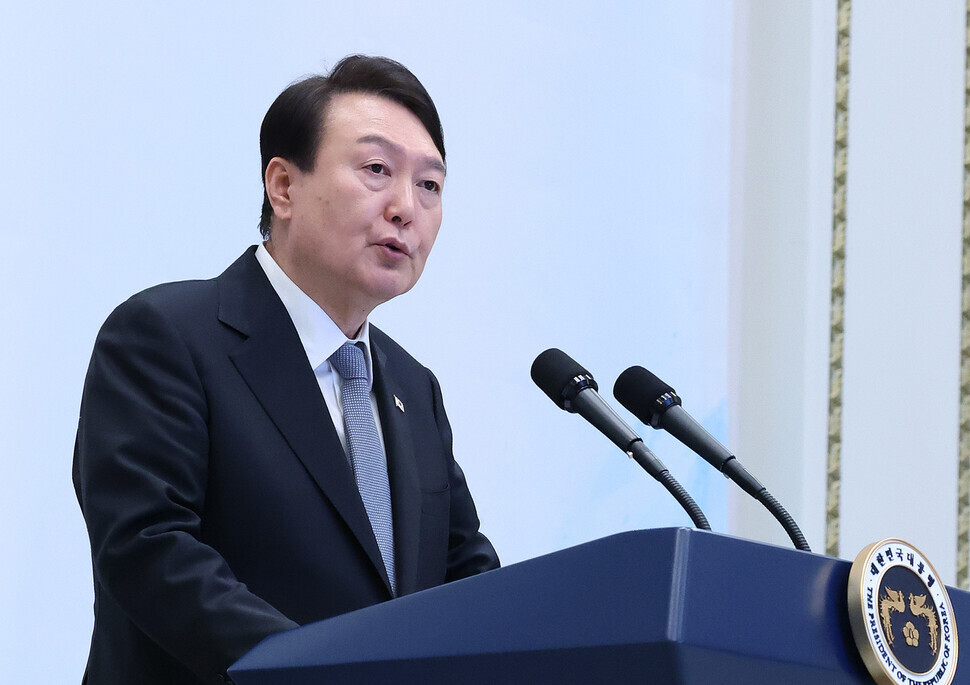hankyoreh
Links to other country sites 다른 나라 사이트 링크
Yoon orders review of workweek reform plan after sharp rebuke from young workers

On Tuesday, President Yoon Suk-yeol instructed a review of his administration’s labor policy that centered on increasing the maximum number of hours allowed per week to 80.5 hours. Having been at the top of Yoon’s domestic policy to-do list for his second year in office, the labor policy’s review appears to be his administration’s reaction to fierce discontent with the proposal from young people in the labor sector due to concerns of overwork.
In relation to the Ministry of Employment and Labor’s workweek hour revision plan, Yoon instructed the ministry to “closely listen to the opinions that have been expressed during the legislative preview period of various workers, especially those of the MZ generation, and review what needs to be improved in terms of the bill’s content and the way that the news was communicated to the public,” said Kim Eun-hye, chief press secretary, in a written briefing on Tuesday.
“MZ generation” is a term used in Korea to refer to the millennial and Gen Z generations.
The government announced a proposed amendment to the Labor Standards Act on March 6 that would extend working hours, which are currently limited to a maximum of 52 hours per week, to a monthly (52 hours of overtime) and annual (440 hours) basis based on labor-management agreements.
The average working hours for a four-week period would remain within 64 hours, but management units would be enabled to work up to 80.5 hours in a seven-day workweek, or 69 hours in a six-day workweek.
While the government stressed the idea of “intensive work, followed by lots of rest,” workers called the plan “unrealistic,” and said that it only encouraged long working hours.
In particular a young worker-oriented coalition of eight unions known as the “Refresh Labor Council” expressed its opposition to the government’s plan on Thursday, saying, “Increasing overtime hours in South Korea, where the average working hours are already high compared to major developed countries, goes against the international community’s efforts to improve working conditions.”
A senior official from the presidential office told the Hankyoreh, “The government’s reorganization plan is to go for the trifecta of working time choice, the right to health, and the right to time off, but there are too many concerns framing it as ‘long working hours,’ which is not true. The president instructed that the bill be made stronger to dispel these concerns.”
The Ministry of Employment and Labor issued a statement to the media following Yoon’s directive, saying, “As [the proposal] is currently the legislative preview period, we will listen to various voices of the people, including the youth, and actively visit and communicate with them.”
With Yoon’s directive for a revision coming a mere week after the plan’s first announcement and its intention to be submitted to the National Assembly, comments from Prime Minister Han Duck-soo only added to the confusion. Han told reporters on Tuesday afternoon that “the overall frame won’t change. It’s not a complete return to the drawing board.”
This was interpreted as an attempt to appease the younger generation of workers while maintaining the current plan. When reporters pointed out that this was different from what Yoon stated that morning, Han said, “I spoke to the president on the phone.”
Some opposition politicians have called for the government’s labor policy to be scrapped altogether.
“The 69-hour workweek comes from the president’s regressive labor view of a ‘120-hour workweek,’” said Lee Soo-jin, spokesperson for the Democratic Party of Korea, calling the policy “wrong from its inception.”
By Kim Mi-na, staff reporter; Bang Jun-ho, staff reporter
Please direct questions or comments to [english@hani.co.kr]

Editorial・opinion
![[Column] Life on our Trisolaris [Column] Life on our Trisolaris](https://flexible.img.hani.co.kr/flexible/normal/500/300/imgdb/original/2024/0505/4817148682278544.jpg) [Column] Life on our Trisolaris
[Column] Life on our Trisolaris![[Editorial] Penalties for airing allegations against Korea’s first lady endanger free press [Editorial] Penalties for airing allegations against Korea’s first lady endanger free press](https://flexible.img.hani.co.kr/flexible/normal/500/300/imgdb/original/2024/0502/1817146398095106.jpg) [Editorial] Penalties for airing allegations against Korea’s first lady endanger free press
[Editorial] Penalties for airing allegations against Korea’s first lady endanger free press- [Editorial] Yoon must halt procurement of SM-3 interceptor missiles
- [Guest essay] Maybe Korea’s rapid population decline is an opportunity, not a crisis
- [Column] Can Yoon steer diplomacy with Russia, China back on track?
- [Column] Season 2 of special prosecutor probe may be coming to Korea soon
- [Column] Park Geun-hye déjà vu in Yoon Suk-yeol
- [Editorial] New weight of N. Korea’s nuclear threats makes dialogue all the more urgent
- [Guest essay] The real reason Korea’s new right wants to dub Rhee a founding father
- [Column] ‘Choson’: Is it time we start referring to N. Korea in its own terms?
Most viewed articles
- 1New sex-ed guidelines forbid teaching about homosexuality
- 2OECD upgrades Korea’s growth forecast from 2.2% to 2.6%
- 360% of young Koreans see no need to have kids after marriage
- 4[Column] Life on our Trisolaris
- 5Months and months of overdue wages are pushing migrant workers in Korea into debt
- 6Korean government’s compromise plan for medical reform swiftly rejected by doctors
- 7[Guest essay] Maybe Korea’s rapid population decline is an opportunity, not a crisis
- 8S. Korea discusses participation in defense development with AUKUS alliance
- 9Presidential office warns of veto in response to opposition passing special counsel probe act
- 10Inside the law for a special counsel probe over a Korean Marine’s death